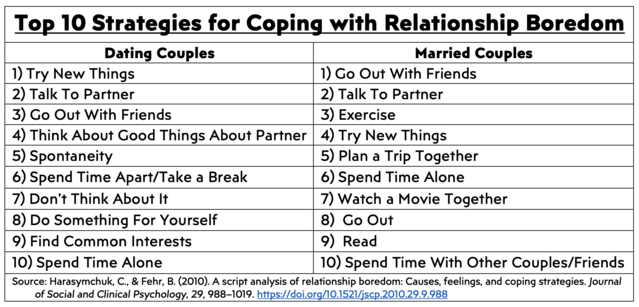Boredom
How to Beat Relationship Boredom
Common causes of boredom to look out for—and the best solutions.
Posted September 21, 2021 Reviewed by Abigail Fagan
Key points
- There are many causes of boredom, but they all generally deprive the relationship of novelty and stimulation.
- Though boredom may be unavoidable, couples should view it as an opportunity to improve the relationship.
- Strategies for couples to overcome boredom include trying new activities, going out with friends, and spending a little time alone.

Early on, relationships are easy—at least they should be. In those beginning stages, everything about your partner is new and exciting. Everything they say is endearing. Their stories are fascinating, their jokes are funny. Your time spent together is fun and enjoyable, merely because you’re with them.
Sadly, it isn’t always that simple and those feelings don’t last forever. Life happens. Work, obligations, and kids get in the way. It all begins to wear away at your relationship. As the months and years fly past, relationship excitement erodes. The magic seems to have disappeared. You’re not only stuck in a rut, but you also don’t know how to get out. You’re bored.
Boredom Is a Signal
Boredom shouldn’t be ignored. In fact, longitudinal research shows that when couples report more current boredom in their relationship, they also report less relationship satisfaction nine years later (Tsapelas et al., 2009). Boredom is a red flag that something in your relationship needs your attention.
What Causes Relationship Boredom?
The first step is identifying the problem’s source. When researchers asked dating and married couples what types of situations led to boredom in their relationship, they gave a variety of causes (Harasymchuk & Fehr, 2010). Although there were many specific reasons (e.g., not seeing the partner or doing the same things), the researchers identified two key themes: lack of novelty and lack of stimulation. Importantly, they also identified the top 10 causes of boredom. That’s helpful because familiarizing yourself with common causes can help you recognize boredom’s early warning signs, avoid those situations, and help keep your relationship exciting.
Boredom Is Natural
Of course, it may be impossible to avoid boredom altogether. If you’re bored, don’t be too hard on yourself, or your relationship. Boredom is natural. As humans we’ve evolved to adapt to our situations. The excitement we feel early on in any experience dissipates over time. We habituate. As we learn more about our relationship partner, there are fewer opportunities to learn new things. As we fall into routines, there’s less excitement.
That doesn’t mean that boredom isn’t something we should look out for and address. As humans we have an innate need for novelty and variety (Bagheri & Milyavskaya, 2020). Essentially, it’s hardwired. When we’re lacking new and exciting experiences, we feel unfulfilled. What we can do is “embrace the suck.” It’s a Buddhist-military hybrid philosophy that uses negative experiences as pivot points that set us on a better path. Think of boredom as your own “check relationship” warning light that motivates you to make a change (Bench & Lench, 2013). But what kind?
Beating Boredom
Couples get it. They know that boredom is bad and a clear-cut sign to pay more attention to the relationship. But how? When dating and married couples gave their top strategies for beating boredom, the activities focused on active strategies designed to strengthen the relationship such as talking to the partner, trying new things, and going out with friends. Married couples were more likely to focus more on the self by doing things like exercising, focusing on their career, and spending time alone.

Better Boredom Solution? Familiarity vs. Novelty
In fact, when trying to counteract boredom, there are two common sense strategies for strengthening the relationship: Stick to what you know works or try something completely different. Knowing the best way to fight boredom isn’t obvious, so researchers wanted to see what participants would do (Harasymchuk et al., 2017). The safe choice is to do something familiar that you know will help you and your partner feel more secure with the relationship. The other option is a bit riskier. Try something new. It could be interesting, or it could be awkward, horrible, and backfire. When bored participants had this choice, they didn’t play it safe. They went for novelty. They chose activities that aimed at self-growth. It’s a really smart choice because those activities also helped the relationship.
The Take Home
Relationships aren’t easy. Boredom is an experience that nearly every relationship has at some point. The key is to recognize boredom for what it is: a warning sign. Use it as an opportunity to rekindle your connection to your partner by doing something new. Instead of staying in, go out. Instead of doing the usual, do the unexpected. By doing something new you’ll invigorate your relationship and rediscover the magic that got you hooked in the first place.
Facebook image: bbernard/Shutterstock
References
Bagheri, L. & Milyavskaya, M. (2020). Novelty–variety as a candidate basic psychological need: New evidence across three studies. Motivation and Emotion, 44, 32–53. https://doi.org/10.1007/s11031-019-09807-4
Bench, S. W., & Lench, H. C. (2013). On the function of boredom. Behavioral Sciences, 3, 459–472.
Harasymchuk, C., Cloutier, A., Peetz, J., & Lebreton, J. (2017). Spicing up the relationship? The effects of relational boredom on shared activities. Journal of Social and Personal Relationships, 34, 833–854. https://doi.org/10.1177/0265407516660216
Harasymchuk, C., & Fehr, B. (2010). A script analysis of relationship boredom: Causes, feelings, and coping strategies. Journal of Social and Clinical Psychology, 29, 988–1019. https://doi.org/10.1521/jscp.2010.29.9.988
Tsapelas, I., Aron, A., & Orbuch, T. (2009). Marital boredom now predicts less satisfaction 9 years later. Psychological Science, 20, 543–545. https://doi.org/10.1111/j.1467-9280.2009.02332.x




